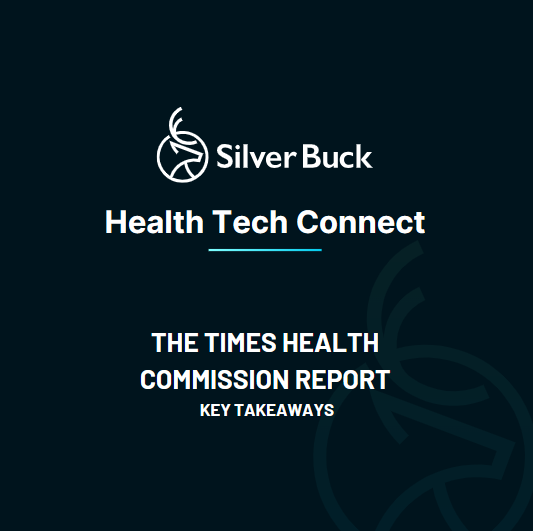Times Health Commission report – Our 5 Key Takeaways

The year long Times Health Commission was set up to address some of the most pressing issues currently facing health and social care. This was largely prompted by the impact of the pandemic on healthcare in England – from growing NHS waiting lists and financial pressures, to health inequalities and an ageing population.
Commissioners held fortnightly evidence sessions to collate the report with a range of people involved in health and care including nurses, senior doctors, scientists, hospital managers, and politicians.
But after all that, what lessons and solutions can we take away from it in the health tech industry?
The Times Health Commission officially published its report in February 2024 and offered recommendations for reform for the top ten problem areas. We were particularly pleased to see an emphasis on how digital can support the NHS to tackle the range of issues faced, with practical examples peppered throughout the report. Having worked with more than 100 health tech companies over the years, we know what a significant impact this can have on improving processes for both healthcare staff and patients.
Here are Silver Buck’s top 5 takeaways from the report, and what it says about the important role of digital to help tackle some of the most pressing issues we face in healthcare.
1.‘Technology has the power to transform healthcare’
This was the overarching theme throughout the report and was a phrase mentioned several times across the various healthcare topics covered. The report highlights how technology can be essential to tackling key challenges faced by the NHS to improve conditions for patients as well as healthcare staff such as increasing patient access by enabling them to book their own appointments online.
2. Patient passports
The report begins with a 10-point plan for health which addresses each of the most urgent problem areas identified by the Commission. The first point advocates for the creation of digital health accounts for patients, called patient passports, which can be accessed through the NHS app to book appointments, order prescriptions, view records, and contact clinicians. The intention with these is that every NHS patient can access their health information digitally and any doctor treating them can view their records from any location, no matter what the time.
3. Digital can help improve access to primary care
The report highlights how digital can improve patient access to their GPs and help spread out the influx of patient requests across care pathways. Digital solutions can enable patients to book appointments independently and make sure they are triaged to the correct pathway from the outset which in turn, can improve the problem of growing wait times in the NHS.
However, with the digital pathways framework for primary care being delayed ‘indefinitely’, we certainly face a myriad of challenges for making this a reality.
4. Digital can help the NHS capture essential data
The Commission flags the significance of monitoring the data available via digital solutions to spot trends on where patient demand lies. By studying this, the NHS can better manage staff capacity and recruit according to where most support is needed. Data can also help tackle health inequalities across the UK by highlighting where there is a prevalence of certain issues, such as obesity or diabetes, which can then be addressed with a more targeted approach.
5. We need to change how people perceive digital tools
The report emphasises a vital factor essential for realising the full benefits of technology in healthcare: the necessity for a behavioural shift, not only among patients, but also with staff. While there may still be some reluctance to embrace digital tools in care settings, educating individuals on how to effectively use relevant solutions and the potential benefits they offer can help encourage their widespread and efficient use. Effective communication is a core pillar of making this happen, and ensuring the technology available is being used effectively.
It’ promising to see the report touch on so many innovative ways that we can improve the current challenges we face in health and social care. It feels as though the dial is beginning to shift, and technology is being viewed as a key driver to tackling inefficiencies, supporting stretched staff and streamlining processes to tackle these long-standing issues.
The report highlights that there is still a long way to go with winning hearts and minds to fully harness the power of digital, and we need to keep talking about all the great stuff happening across the NHS to showcase the benefits of technology when implemented correctly. Good communication going forwards is a big part of this.
Drop us a line to find out how we can help you communicate your offering to the NHS and beyond in the best possible way! We share our insights on Health Tech Connect every Thursday. If you’d like to stay up to date with the latest in digital health, follows #HealthTechConnect and stay tuned.